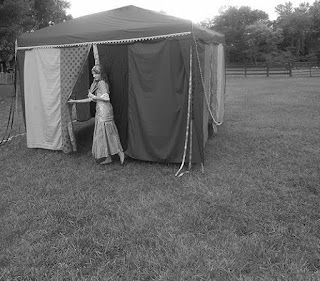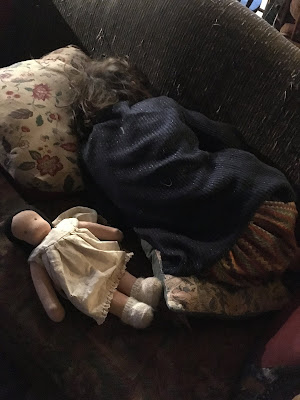Star Wars and the Virgin Birth (1999)
This article was published in Lay Witness, 1999, and as part of a retrospective on my 50th birthday, I have been setting about republishing articles that were published pre-internet, or published on websites which are now obsolete. FYI this text is the author's copy and may vary slightly from the publisher's copy.
I just returned from seeing the long-awaited Star Wars: Episode One: The Phantom Menace, part of George Lucas' cinematic masterpiece, which deals with the early years of Anakin Skywalker, the powerful Jedi Knight who falls from grace to become the evil Darth Vader of the earlier movies. In this first episode, we learn that young Anakin Skywalker is the "chosen one," who was conceived through the Force itself. Anakin's mother tells a visiting Jedi Knight that Anakin has no human father - he just "happened."
Lucas wisely downplays this aspect of the movie, rightly fearing that Christians will suspect an irreverent parody of Christianity - a fallen Christ, born of a virgin.In my eyes, Lucas's theology of the Force, while sharing a few similarities with Christianity (being a loose mixture of Buddhist and New Age beliefs encompassing such discrepasncies as practicing mind control while opposing slavery), is nothing like it. My husband observes that as a pre-revelation theology, a sort of natural religion, it works fairly well in a fictional universe, with varying degrees of coherence and plausibility.
I wasn't threatened by the "divine" birth of Anakin Skywalker. In fact, it is an emotionally unsuccessful plot device. It is so far removed from the reality of the Incarnation in the Catholic understanding that there is almost no similarity, outside of externals. However, it occurred to me that Lucas's portrayal is very similar, in fact almost identical to the low-church Protestant understanding of the Virgin Birth which is prevalent in America today.
In this Protestant interpretation, Mary, a sinner like us all, is a mere incubator, an available womb in the correct genealogical line for the Holy Spirit to use. Her saying "yes" to God is commendable, but not necessary or intrinsic to salvation. In fact, with Christ post-partum, Mary has normal marital relations with Joseph and conceives other human children: she "goes on" with her life.
One thing about this interpretation is that it assumes that Mary and Joseph are like rather dense moderns, who see no connection between the body and moral actions, instead of devout Jews dedicated heart and soul to the God of their Fathers. If I were Joseph, and was told by an angel that my wife had been impregnated by the Spirit of the Most High God, I wouldn't be so quick to assume my husbandly rights over her. On the contrary, I would probably do as Tradition says Joseph did: preserve her virginity with all the protection and loving care of the High Priest over the Ark of the Covenant.
Unlike the Lucas and Protestant versions of the Virgin Birth, the Catholic understanding is so much richer, so much deeper, touching on the unfathomable mystery of God. First of all, Mary is not randomly impregnated by a spiritual Force, but by a Person - the Third Person of the Trinity.
God, from the moment of her conception in her mother's womb, chose Mary and united Himself with her so fully, so completely, that it was a marriage in the full sense of the word. The Holy Spirit became the Spouse of a human Jewish peasant, united His Spirit to her flesh, preserving her from any offense against God, empowering her to live a life that was a magnification of the glory of the Lord. After the Annunciation, He "covered her with His Shadow," in the Hebrew idiom of marital intimacy, and this action was fruitful, bringing forth a Son, and she named Him Jesus.
Given this incredible, historically-unique intimacy with the Godhead, it is ludicrous to imagine that Mary was unconscious of it all. While she might not have understood the theology of the Trinity, she lived her life within Their Life, and pondered all these things in her heart.
In Lucas's movie, Anakin apparently just "shows up" in his mother's womb. In low-church Christianity, Mary at least has the benefit of an angel telling her what is going on. But in the Catholic understanding, the conception of Christ is the culmination, the incredible answer to what must have been Mary's lifetime wondering of who she was and why God had chosen her for this intimacy.
The Virgin Mother of Christ is more than just a Messianic proof. She is an intrinsic part of His life and God's plan, a wonderful convergence of the Divine with the Human that is a foreshadowing of the Divine Nature of Christ Himself, fully God and fully man. The overturning of human history - nature "standing on its head" as GKC puts it -- is accomplished not only through the God-man but through the Immaculata, the Virginal Spouse of the Holy Spirit, the New Eve with the New Adam.
It is wonderful to speculate on the relationship between the Immaculata and the Third Person of the Trinity, wrote St. Maximilian Kolbe, who found in that mystery a fountain of reflection that spanned a lifetime. I wonder if someday filmmakers will find inspiration in the Catholic understanding of the Virgin Birth. It might make a film exciting and fantastic enough to rival the Star Wars series.
copyright Regina Doman, 1999. This document is available for republishing only after the author's permission has been obtained. Click the top button for an email link to the author.


Comments